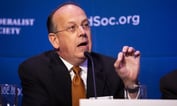One of the most bizarre financial scams in history pivots on a quack doctor and the body part of a goat — anatomy you’d hesitate to chat about with someone you just met. But Ben Carlson, director of institutional asset management at Ritholtz Wealth Management, writes all about this shocking fraud in his new book, “Don’t Fall for It: A Short History of Financial Scams” (Wiley-January 2020).
When it comes to getting sucked in, “people want to believe that if something seems too good to be true, it’s not too good to be true for them because they feel they deserve it,” Carlson tells ThinkAdvisor in an interview.
The popular blogger, at A Wealth of Common Sense, and podcaster — who co-hosts “Animal Spirits” with Michael Batnick, Ritholtz’s research director — had twin goals in penning the book: to entertain and, by detailing scads of scandalous scams, to show readers how to avoid being conned.
In the interview, the chartered financial analyst, who has written for Fortune and whose previous books include “Organizational Alpha,” discusses notorious fraudsters’ nefarious schemes, including that flimflam medical man’s duplicity requiring goats. A film of the charlatan’s life starring Matt Damon is reportedly in discussion.
Carlson, 38, holds that people who are informed about investing are scammed more often than those who know nothing about it.
In the interview, he also provides an explanation for just how Bernie Madoff lulled his approximately 37,000 victims into a false sense of financial security.
Further, the author zeros in on the biggest of six warning signs indicating that fraud’s afoot and, in a sad twist, explores how Johnny Depp, sporting an extravagant lifestyle, essentially defrauded himself.
Before joining Ritholtz, the CFA was an investment analyst with Van Andel Institute and Aileron Ltd.
ThinkAdvisor recently interviewed Carlson, on the phone from his office in Grand Rapids, Michigan. He opined that there will always be folks who lack “the willpower” to say no to a seductive pitch.
Here are highlights of our conversation:
THINKADVISOR: Is the time ripe for financial scams?
BEN CARLSON: Yes. With the bull market running for a long time now, people are taking more risk, particularly with interest rates as low as they’ve been in generations and people who are retiring needing a certain asset or return level to meet goals. Baby boomers coming to retirement in droves will be prime targets for scams because they’ve got some money. A lot of them will need to take risks. Some will take more risk than they probably should and get themselves into hot water.
You write about environments in which “fraud flourishes.” One is when the banking industry “gets involved.” Please elaborate.
That was obvious during the financial crisis. But one thing people are trying to figure out now is why there isn’t as much euphoria in the bull market as in the past.
What do they suppose is the reason?
People are investing in index funds and [other] low-cost funds, and active managers have fallen behind. So Wall Street hasn’t really participated in the bull market [enough] to put their foot on the gas. Wall Street can really fan the flames, but they haven’t done it this time around.
Fraud flourishes too, you write, when “capital becomes blind.” For example, Elvis Presley’s father, Vernon, let his guard down when he put his son’s rarely used private plane up for sale.
Right. Con artist Fred Pro swooped down and made it sound like he was paying Vernon Presley to take the plane off his hands. But he and his crew ended up taking it to New York for a “test drive” and never returned. The checks they sent Vernon Presley were found to be forged. That’s when he went to the FBI, who told him, “They promised things they couldn’t deliver, but you never looked into it.” He hadn’t done any background checks on the people who were conning him.
What surprised you most in researching this book?
That people can always get duped. It doesn’t matter what we learn because there will always be [some] people who’ll latch onto these stories [pitches]. A certain subset of the population doesn’t have the willpower to say no to someone who’s really good at selling you.
What was the scam you found to be the most interesting?
Dr. John Brinkley’s. He implanted goat testicles in men’s scrotums with the promise that this would make their wives become pregnant, after the couples had been trying unsuccessfully for pregnancy for a long time. This was in the 1920s — the wild, wild west before there were legitimate standards for doctors. It sounds like they may make a movie about this guy starring Matt Damon.
Speaking of movie stars, Johnny Depp virtually defrauded himself, you write. How so?
He was spending so much money and not caring about what the ramifications could be. He’d made three-quarters of a billion dollars during the course of his career but was living paycheck to paycheck. It’s hard to believe that you could make $20 million-plus on a movie and have to do another one just to keep up your lifestyle. He was spending so much on himself and his family — buying private islands in the Bahamas and a chateau in France.









 January 17, 2020 at 10:50 AM
January 17, 2020 at 10:50 AM











